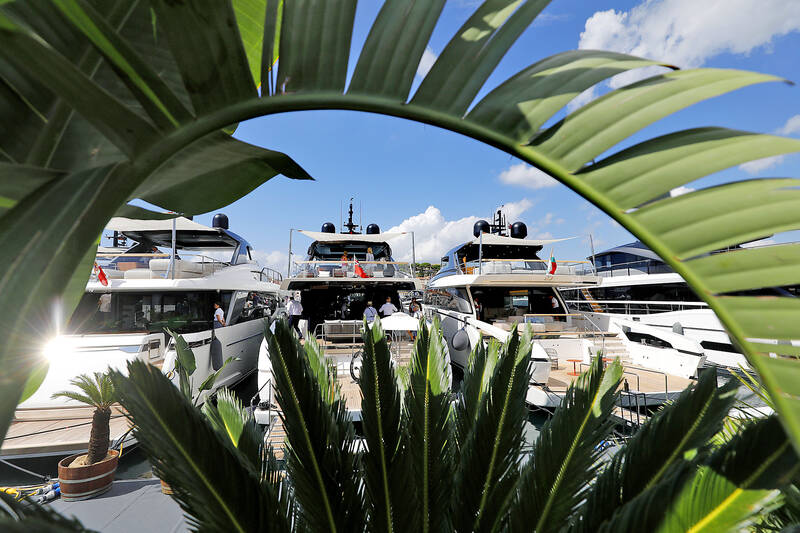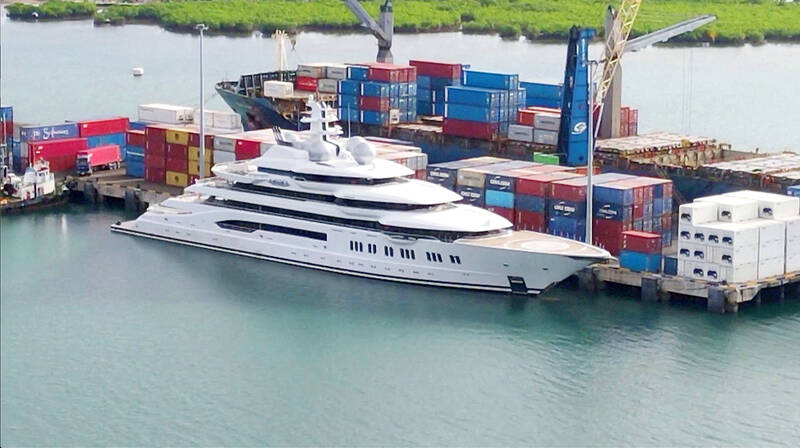Stacy Fischer-Rosenthal and her 30-strong team have had a busy summer booking private yachts for bankers, CEOs and other high flyers now liberated from the shackles of the COVID-19 pandemic and willing to pay millions of dollars for week-long luxury cruises.
Bookings for superyachts through Fischer Travel Enterprises, where Fischer-Rosenthal is president, have spiked 20 percent this year from already high levels last year, a trend also seen by other companies chartering out luxury vessels that can come with all the frills from Michelin-starred cuisine to cinemas and submarines.
“Yacht charters are very popular because our clients want the privacy, security and flexibility that it gives them,” Fischer-Rosenthal said.

Photo: EPA-EFE
Her company charges US$150,000 just to join its members-only service, through which superyachts can be chartered anywhere around the world.
“They want to have a luxurious experience,” she said about her customers.
Americans are a growing client base, helping to fill gaps left by wealthy Russians who are not traveling as much due to restrictions following their country’s invasion of Ukraine.

Photo: Reuters
And it is not just the likes of Elon Musk or Beyonce and Jay-Z hiring out these glitzy floating palaces.
Fischer-Rosenthal said a couple from the US enjoyed their cruise in Greece and Turkey in July so much they booked another in Italy shortly after and invited friends along.
Fraser Yachts, which sells and manages superyachts, and arranges charters, booked nearly 500 private trips in the first half of this year, company director of marketing and business development Mark Duncan said.
Bookings are up 32 percent from last year, and again most of the growth is being driven by Americans, many of whom are renting for the first time, said Duncan, who is based in Monaco.
Among the megayachts the firm hires out is Wheels, a 75m vessel with a gym and nightclub.
The number of Americans with a net worth of US$1 million to US$5 million last year grew 8 percent to more than 12 million, while those worth US$25 million or more climbed 18 percent, according to research company Spectrem Group.
“Our clients are high-net worth individuals, running banks and hedge funds,” Fischer-Rosenthal said. “They’ve made a lot of money in the last few years. Now they want to travel again and they want the best.”
Customers are also getting younger, now averaging in their 50s rather than the 60-to-65 age bracket in the past two decades, Duncan said.
This year, about 35 percent of Fraser’s clients are new to yachting, compared with up to 15 percent previously, he said.
Cruises involving several generations from the same family are also more popular.
“During the pandemic, people couldn’t be with their families,” Duncan said. “Yachts can be big enough for all to be together. Unlike a home, you’re not stuck in one place. And you can control the environment and test everyone for COVID if that’s a concern.”
The trend of families and friends traveling together is spurring demand for bigger superyachts.
Monaco-based Camper & Nicholsons International Ltd is seeing highest demand in the 50m to 60m range, said Jacqui Lockhart, the firm’s Europe head of charter management.
“They often know exactly what they want — a big yacht that’s less than three years old,” Lockhart said, adding that the company’s overall bookings are up as much as 30 percent this year.
“They know the style of yacht they want, from which shipbuilder even,” she said.
One of the world’s most expensive superyachts, available for charter through Camper & Nicholsons, is the 126m Octopus, which counts among its features two helipads, an elevator and basketball court.
Previously owned by Microsoft Corp cofounder Paul Allen, the Octopus costs from US$2.2 million a week to rent. As many as 42 crew are on board to cater to a maximum of 12 guests.
It is booked for three weeks in Antarctica this winter, and Camper & Nicholsons said it is already fielding requests for month-long excursions next summer in the Mediterranean.
There are about 3,100 private yachts available for charter globally, Duncan said.
However, the number of superyachts has dipped as sanctions on Russia removed some from the market. One of those, the 72-meter Axioma, was owned by Russian billionaire Dmitry Pumpyansky and had been listed for charter for about US$632,000 a week in peak summer. It was seized at the start of the war in Ukraine and put up for sale at public auction last month.
There is also more scrutiny on private rentals.
“Clients are asking about the yachts and the ownership,” said Alexandru Zamfirescu, an independent yacht broker based in Monaco. “They want to steer away from any trouble.”
Still, business is good, and brokers are focused on getting clients onto boats, advising them to book within days of getting a quote. There is usually no negotiation with owners on prices.
“Luxury yachting is thriving,” Zamfirescu said.

Semiconductor shares in China surged yesterday after Reuters reported the US had ordered chipmaking giant Taiwan Semiconductor Manufacturing Co (TSMC, 台積電) to halt shipments of advanced chips to Chinese customers, which investors believe could accelerate Beijing’s self-reliance efforts. TSMC yesterday started to suspend shipments of certain sophisticated chips to some Chinese clients after receiving a letter from the US Department of Commerce imposing export restrictions on those products, Reuters reported on Sunday, citing an unnamed source. The US imposed export restrictions on TSMC’s 7-nanometer or more advanced designs, Reuters reported. Investors figured that would encourage authorities to support China’s industry and bought shares

TECH WAR CONTINUES: The suspension of TSMC AI chips and GPUs would be a heavy blow to China’s chip designers and would affect its competitive edge Taiwan Semiconductor Manufacturing Co (TSMC, 台積電), the world’s biggest contract chipmaker, is reportedly to halt supply of artificial intelligence (AI) chips and graphics processing units (GPUs) made on 7-nanometer or more advanced process technologies from next week in order to comply with US Department of Commerce rules. TSMC has sent e-mails to its Chinese AI customers, informing them about the suspension starting on Monday, Chinese online news outlet Ijiwei.com (愛集微) reported yesterday. The US Department of Commerce has not formally unveiled further semiconductor measures against China yet. “TSMC does not comment on market rumors. TSMC is a law-abiding company and we are

FLEXIBLE: Taiwan can develop its own ground station equipment, and has highly competitive manufacturers and suppliers with diversified production, the MOEA said The Ministry of Economic Affairs (MOEA) yesterday disputed reports that suppliers to US-based Space Exploration Technologies Corp (SpaceX) had been asked to move production out of Taiwan. Reuters had reported on Tuesday last week that Elon Musk-owned SpaceX had asked their manufacturers to produce outside of Taiwan given geopolitical risks and that at least one Taiwanese supplier had been pushed to relocate production to Vietnam. SpaceX’s requests place a renewed focus on the contentious relationship Musk has had with Taiwan, especially after he said last year that Taiwan is an “integral part” of China, sparking sharp criticism from Taiwanese authorities. The ministry said

US President Joe Biden’s administration is racing to complete CHIPS and Science Act agreements with companies such as Intel Corp and Samsung Electronics Co, aiming to shore up one of its signature initiatives before US president-elect Donald Trump enters the White House. The US Department of Commerce has allocated more than 90 percent of the US$39 billion in grants under the act, a landmark law enacted in 2022 designed to rebuild the domestic chip industry. However, the agency has only announced one binding agreement so far. The next two months would prove critical for more than 20 companies still in the process